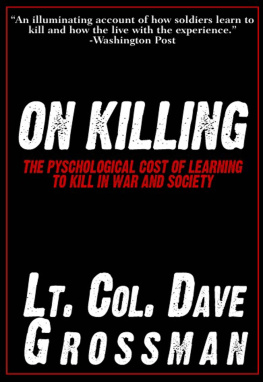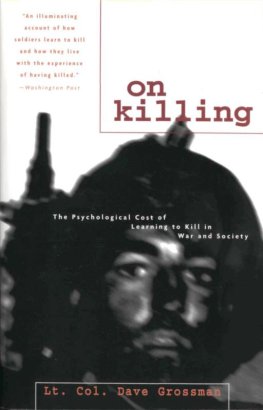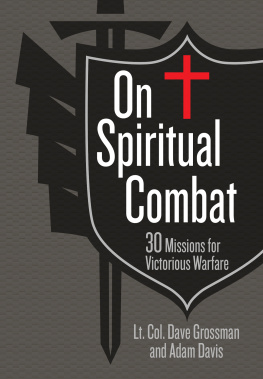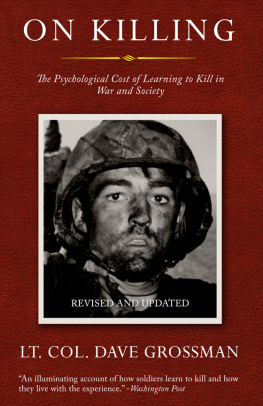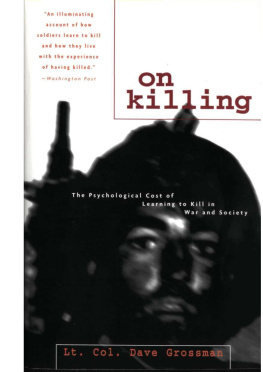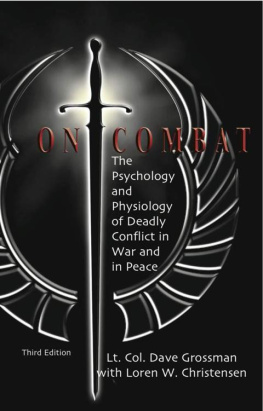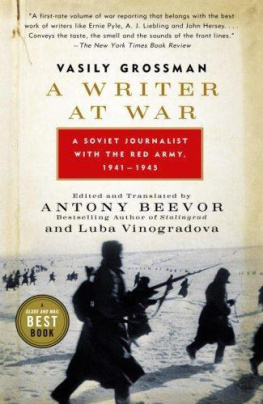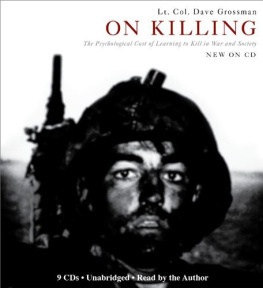E-Rights/E-Reads, Ltd. Publishers
171 East 74th Street, New York, NY 10021
Copyright 1995, 1996, 2009 by Dave Grossman.
All rights reserved. No part of this book may be reproduced or transmitted in any form or by any means, electronic, or mechanical, including photocopy, recording, scanning or any information storage retrieval system, without explicit permission in writing from the Author or Publishers.
Not of the princes and prelates with periwigged charioteers
Riding triumphantly laureled to lap the fat of the years,
Rather the scornedthe rejectedthe men hemmed in with spears;
The men in tattered battalion which fights till it dies,
Dazed with the dust of the battle, the din and the cries,
The men with the broken heads and the blood running into their eyes.
Not the be-medalled Commander, beloved of the throne,
Riding cock-horse to parade when the bugles are blown,
But the lads who carried the hill and cannot be known.
Others may sing of the wine and the wealth and the mirth,
The portly presence of potentates goodly in girth;
Mine be the dirt and the dross, the dust and scum of the earth!
Theirs be the music, the colour, the glory, the gold;
Mine be a handful of ashes, a mouthful of mould.
Of the maimed, of the halt and the blind in the rain and the cold
Of these shall my songs be fashioned, my tale be told. Amen.
John Masefield
A Consecration
Acknowledgments
War has always interested me; not war in the sense of maneuvers devised by great generalsbut the reality of war, the actual killing. I was more interested to know in what way and under the influence of what feelings one soldier kills another than to know how the armies were arranged at Austerlitz and Borodino.
Leo Tolstoy
I have been assisted in this study by a host of great men and women who have stood beside me and gone before me in this endeavor. These I do now gratefully acknowledge.
To my wonderful and infinitely patient wife, Jeanne, for her staunch support; to my mother, Sally Grossman; and to Duane Grossman, my father and co-conspirator, whose many hours of help in research and concept made this book possible.
To Jan Camp, who helped with preparing the final draft and getting quotation authorizations.
To Major Bob Leonhard, Captain Rich Hooker, Lieutenant Colonel Bob Harris, Major/Dr. Duane Tway, and that indomitable team, Harold Thiele and Elantu Viovoide: peers, friends, and fellow believers who have endured many a crude draft and contributed much time and effort to assisting and supporting me in this work.
To Richard Curtis, my literary agent, who contributed significantly and then waited long and patiently for the completion of this work. And to Roger Donald and Geoff Kloske, my editors at Little, Brown and Company, who had faith in this book and then worked long and hard to help me to fine-tune it into a professional product.
To that magnificent group of soldier-scholars at the U.S. Military Academy whom I had the privilege of working with: Colonel Jack Beach, Colonel John Wattendorf, Lieutenant Colonel Jose Picart, and all the gang in the PL100 committee. And to that superb group of West Point cadets who volunteered to spend their summer conducting interviews, testing some of the theories presented in this book.
To my fellow students at the British Army Staff College at Camberley, England, who provided me with one of the finest and most intellectually stimulating years of my life.
To all of those remarkable soldiers who have molded, mentored, befriended, and commanded me, patiently giving of their wisdom and experiences over twenty years: First Sergeant Donald Wing-rove, Sergeant First Class Carmel Sanchez, Lieutenant Greg Parlier, Captain Ivan Middlemiss, Major Jeff Rock, Lieutenant Colonel Ed Chamberlain, Lieutenant Colonel Rick Everett, Colonel George Fisher, Major General William H. Harrison, and countless others to whom I owe so much. And to Chaplain Jim Boyle: Ranger buddy, friend, and true brother. For most of these this is not their current rank, but that was what they were when I needed them most.
To Dr. John Warfield and Dr. Phillip Powell, at the University of Texas at Austin, who gave unselfishly of their wealth of wisdom and knowledge, while trusting me and letting me do it my way. And to Dr. John Lupo and Dr. Hugh Rodgers at Columbus College, in Columbus, Georgia, from whom I learned to love history.
I also need to make special acknowledgment of the extensive use I have made of the recent and excellent books by Paddy Griffith, Gwynne Dyer, John Keegan, Richard Gabriel, and Richard Holmes. Paddy Griffith was a boon mentor, friend, and companion during my stay in England, and along with Richard Holmes and John Keegan he is one of the worlds true giants in this field today. And I particularly want to note that this study would have been much more difficult to complete without drawing on the tremendous body of insight and personal narratives collected in Richard Holmess book Acts of War . Holmess superb book will be the primary reference source for generations of scholars who study the processes of men in battle. My correspondence with him has confirmed that he is a gentleman, a gentle man, and a soldier-scholar of the highest order.
And I need to recognize that one of this studys most valuable and unusual sources of individual narratives has been the pages of Soldier of Fortune magazine. The image of the traumatized Vietnam veteran being spit upon, insulted, and degraded upon return to the United States is not mythical, but based upon literally thousands of such incidentsas chronicled in Bob Greenes excellent book, Homecoming . In this environment of condemnation and accusation, many Vietnam veterans felt that they had only one national forum in which they could attain some degree of closure by writing of their experiences in a sympathetic and nonjudgmental environment, and that forum was Soldier of Fortune magazine. To those who would prejudge this material and automatically reject anything coming from this quarter as mindless machismo, I ask that you read these narratives first. I am particularly indebted to Colonel Harris for his recommendation of this novel resource, and for the loan of his personal collection of these magazines. Most of all I need to thank Colonel (retired) Alex McColl, at Soldier of Fortune, for his support in using these quotes. It is good to know that there are still places where an officer is a gentleman, his word is his bond, and that is all that is required.
And to the many young American warriors who have been entrusted to me for leadership and trainingWest Point cadets, ROTC cadets, soldiers, marines, and police officersit has been my privilege to teach them, and my honor to guide them in the way of the warrior.
Last, and most important , to all the veterans throughout history who have recorded their responses to killing, and to those in my own life who permitted me to interview them. To Rich, Tim, Bruce, Dave, Sarge (Arf!), the Sheepdog Committee, and a hundred others who have shared secrets with me. And to their wives, who sat beside them and held their hands while they wept and told of things they had never told before. To Brenda, Nan, Lorraine, and dozens of others. All those who spoke with me have been promised anonymity in return for their secret thoughts, but my debt to them is such that it can never be paid.

